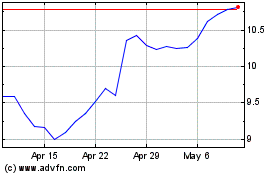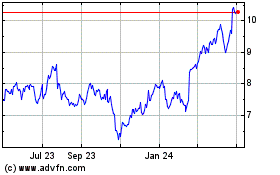Deutsche and Barclays Feel the Investment Bank Burn
October 26 2017 - 9:59AM
Dow Jones News
By Max Colchester and Jenny Strasburg
New bosses took the reins at Barclays PLC and Deutsche Bank AG
two years ago promising sharper strategies and clearer paths for
the embattled lenders. Investors still seem foggy on the CEOs'
vision.
Both big European banks said Thursday they suffered 30% slumps
in trading revenue in the third quarter, a disappointing result
even considering the historically low market volatility. On average
U.S. banks' trading revenues dropped half that amount this
quarter.
Barclays shares slumped 6% in afternoon trading Thursday.
Deutsche Bank's were down 1.8%. No major European lenders' shares
have performed worse since the start of the year. The pressure is
rising on Jes Staley and John Cryan, chief executives of the
British and German lenders, respectively, to deliver results rather
than reassurances.
Two of Europe's marquee banks have already gone through dramatic
overhauls. At Barclays, Mr. Staley implemented a plan to ditch
billions of dollars in assets, exit over a dozen countries and cut
60,000 staff. At Deutsche Bank, Mr. Cryan has also axed clients,
business lines and thousands of staff, settled big regulatory
probes and is planning to list part of the German bank's asset
management business.
However investors still don't see how much the big changes will
ultimately pay off, or when.
While Europe's economic rebound is helping fuel retail and
corporate banking business, analysts still question whether
European investment banks have the muscle to take on their U.S.
rivals. Deutsche Bank and Barclays are the world's sixth and
seventh largest investment banks by revenue, according to data by
Coalition.
On Thursday, Barclays recorded a third-quarter profit, helped by
a fall in regulatory fines and operating costs. But the subsequent
share drop reflects how investors are growing increasingly
skeptical that Mr. Staley can build a competitive investment bank
without pouring in huge resources. The bank said shareholders would
have to wait until early next year to get clarity on dividends.
Meanwhile, Mr. Staley is pushing on with a plan to revamp the
markets business by redeploying capital into the unit and the
recent hire of around two dozen new bankers. "We have a way to go,"
he said on Thursday.
Deutsche Bank faces a similar investment banking headache. On
Thursday it said its third-quarter profit more than doubled,
beating analysts' expectations, even though trading and overall
revenue dropped sharply. Deutsche Bank, once one of the world's
most highly leveraged banks, has had to wean itself off the
borrowing and capital-intensive trades that once juiced profits.
Investors by and large accepted that it had to happen eventually,
but they want to see proof that the German bank can maintain much
of its dominant presence in fixed-income trading.
After losing ground there last year, the bank has clawed some
fixed-income business back, but investors say it's not enough
yet.
Goldman Sachs Group Inc. European banking analysts on Thursday
called both Deutsche Bank's and Barclays's third-quarter results
"weak," highlighting their dismal investment-banking performance
relative to U.S. peers.
To be sure, there is a major difference between the two banks:
Barclays has a profitable U.K. retail and credit card business it
can lean on when its investment bank undershoots. Deutsche Bank
lacks a second profit machine that is on a par with its investment
bank. Of the two bank CEOs, "Cryan inherited far and away the
hardest job," said Barrington Pitt Miller, portfolio manager
covering global financials at Janus Henderson Investors.
Recently, Barclays Chairman John McFarlane canceled a vacation
and spent several days analyzing the British bank's financial
results, according to a person familiar with the matter. He found
that--if current regulations were applied--the bank only met its
cost of equity twice in the last 20 years. But it's unclear what
Barclays can do differently.
Analysts say winding down its underperforming European
investment bank would cost too much. At a recent meeting in a posh
stately home Barclays's board members continued to back the current
strategy, according to people familiar with the matter.
But Mr. Staley's future could be out of their hands. The banker
is being probed by U.K. regulators over his efforts to unmask a
whistleblower. Mr. Staley has apologized for his actions, but some
senior Barclays staffers fear that he may be forced to throw in the
towel. On Thursday Mr. Staley said that the probe was ongoing and
didn't comment further.
Pressures on Deutsche Bank have contributed to recent tensions
in its executive ranks, including between Mr. Cryan and Paul
Achleitner, the chairman, The Wall Street Journal reported this
month, citing people close to both men. Some of the people said any
tensions are natural and manageable, but evidence of the clashes
has caught the attention of clients and investors, people close to
the bank say.
As Deutsche Bank executives weigh internal budget requests for
next year, they're having to manage massive costs to fix badly
outdated technology and competing requests for money to deal with
Brexit preparations and hiring in the investment bank, the people
say.
Mr. Cryan said Thursday in a statement that the bank has made
"significant progress" in turnaround plans. "We are convinced that
the benefits of our efforts will step-by-step become more apparent
in the coming quarters and years," he said.
Write to Max Colchester at max.colchester@wsj.com and Jenny
Strasburg at jenny.strasburg@wsj.com
(END) Dow Jones Newswires
October 26, 2017 09:44 ET (13:44 GMT)
Copyright (c) 2017 Dow Jones & Company, Inc.
Barclays (NYSE:BCS)
Historical Stock Chart
From Oct 2024 to Nov 2024

Barclays (NYSE:BCS)
Historical Stock Chart
From Nov 2023 to Nov 2024
